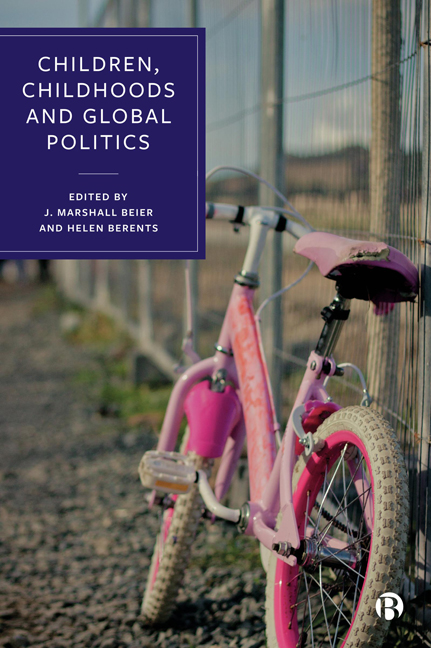Introduction: Children and Childhoods in Global Political Perspective
Published online by Cambridge University Press: 03 April 2024
Summary
What would global political life look like without children and childhoods? If the question seems an odd one, it is perhaps because it presumes something quite outside the ambit of what global politics is usually understood to enclose, and well beyond the realm of possibilities normally imagined about childhood. Certainly, for students and scholars of disciplinary International Relations (IR), the association is not an intuitive one, but neither has it figured significantly in the wider interdisciplinary spaces concerned with critically interrogating the politics of the global. And yet, the provocation is important because, despite a dearth of attention to children and childhoods, they are indivisible from and indispensable to discourses and practices of global politics. Though the dominant understanding of childhood is premised on developmentalist-inspired assumptions of children’s incapacity and the consequent deferment of their meaningful participation in the social worlds we share, this belies not only their competence as everyday social actors but also the ways in which they are relied upon as such. And while imagined childhood is sentimentalized as a time of innocence, understood to demand a unique claim on protection from the harsh realities of the world, the fact is that children the world over contend daily with ‘adult’ life through, among other things, participation in labour markets, shouldering domestic responsibilities on which households and communities depend, enduring structural deprivations, navigating complex emergencies, and experiencing armed conflict. What is more, the everyday functioning of global systems of material production and the maintenance of status quo power relations depends on millions of children performing essential functions and fulfilling important roles across these and other contexts.
While recognizing and taking seriously this indispensability of children to socio-political life is a critical first move towards finding them in global politics, coming to a sophisticated and nuanced understanding of childhood(s) themselves is no less crucial. On first gloss, the meaning of childhood may seem self-evident as a temporally delineated formative stage of the human life course. This aligns well not only with vernacular usage and but also with culturally and historically specific common senses that hold childhood – and, by extension, children – sequestered behind some nominally fixed age threshold. For juridical purposes, this lends straightforward criteria for the governance of children through agecontingent deferment of rights, participation, bodily autonomy, and more.
- Type
- Chapter
- Information
- Children, Childhoods, and Global Politics , pp. 1 - 14Publisher: Bristol University PressPrint publication year: 2023



